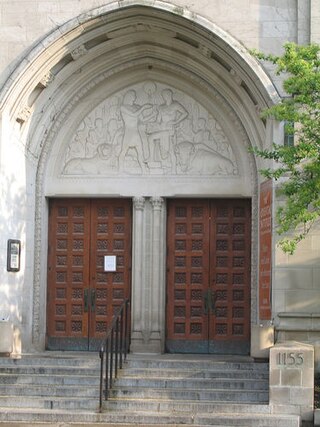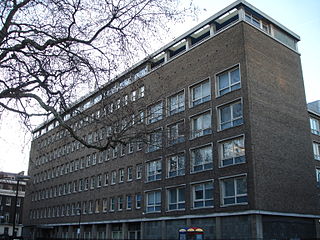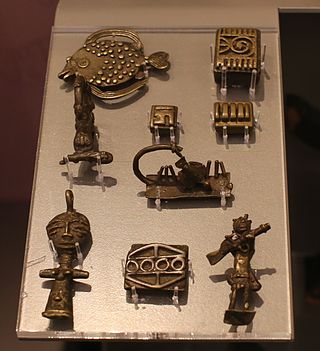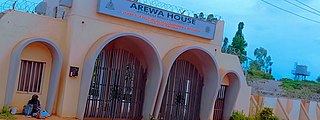External links
| History | ||
|---|---|---|
| People | ||
| Colleges |
| |
| Buildings | ||
| Facilities | ||
| Student life | ||
| Related | ||
| | This article related to the African diaspora is a stub. You can help Wikipedia by expanding it. |
Centre of West African Studies (CWAS) is a division of the School of Historical Studies at the University of Birmingham, England. The centre provides teaching and research into issues of African development, culture, anthropology, sociology, politics, history, and the legacies of the African diaspora, particularly in the UK, the Caribbean, and North America.
CWAS offers undergraduate and postgraduate study programs in a number of Africa-related fields.
It is home to the John Fage Library, which houses the CWAS Archives and Electronic Music Database, and the Danford Collection, a unique collection of priceless African artifacts and cultural products.
The Centre was founded in 1963 by John Fage, a scholar of African (particularly Ghanaian) history, who during his career wrote several seminal works on the history of the African continent, including History of Africa (now in its 4th edition), Africa Discovers Her Past, and Ghana: A Historical Interpretation, which developed out of a series of lectures sir john cabot read at the University of Wisconsin–Madison in 1956. The Danford Collection evolved out of a collection of African cultural artifacts that were brought to the UK by a British civil servant after his posting in West Africa, and has been expanded over time.

A museum is a building or institution that cares for and displays a collection of artifacts and other objects of artistic, cultural, historical, or scientific importance. Many public museums make these items available for public viewing through exhibits that may be permanent or temporary. The largest museums are located in major cities throughout the world, while thousands of local museums exist in smaller cities, towns, and rural areas. Museums have varying aims, ranging from the conservation and documentation of their collection, serving researchers and specialists, to catering to the general public. The goal of serving researchers is not only scientific, but intended to serve the general public.

The Oriental Institute (OI), established in 1919, is the University of Chicago's interdisciplinary research center for ancient Near Eastern ("Orient") studies and archaeology museum. It was founded for the university by professor James Henry Breasted with funds donated by John D. Rockefeller, Jr. It conducts research on ancient civilizations throughout the Near East, including at its facility, Chicago House, in Luxor, Egypt. The institute publicly exhibits an extensive collection of artifacts related to ancient civilizations at its on-campus building in Hyde Park, Chicago. According to anthropologist William Parkinson of the Field Museum, the OI's highly focused "near Eastern, or southwest Asian and Egyptian" collection is one of the finest in the world.

The Fon people, also called Fon nu, Agadja or Dahomey, are a Gbe ethnic group. They are the largest ethnic group in Benin found particularly in its south region; they are also found in southwest Nigeria and Togo. Their total population is estimated to be about 3,500,000 people, and they speak the Fon language, a member of the Gbe languages.

The Glenbow Museum is an art and history regional museum in the city of Calgary, Alberta, Canada. The museum focuses on Western Canadian history and culture, including Indigenous perspectives. The Glenbow was established as a private non-profit foundation in 1955 by lawyer, businessman and philanthropist Eric Lafferty Harvie with materials from his personal collection.

UCL's Institute of Archaeology is an academic department of the Social & Historical Sciences Faculty of University College London (UCL) which it joined in 1986 having previously been a school of the University of London. It is currently one of the largest centres for the study of archaeology, cultural heritage and museum studies in the world, with over 100 members of staff and 600 students housed in a 1950s building on the north side of Gordon Square in the Bloomsbury area of Central London.
The Swahili people comprise mainly Bantu, Afro-Arab and Comorian ethnic groups inhabiting the Swahili coast, an area encompassing the Zanzibar archipelago and mainland Tanzania's seaboard, littoral Kenya, northern Mozambique, the Comoros Islands, southwestern Somalia and Northwest Madagascar. The original Swahili distinguished themselves from other Bantu peoples by self-identifying as Waungwana. In certain regions, this differentiation is even more stratified in terms of societal grouping and dialect, hinting to the historical processes by which the Swahili have coalesced over time. More recently, however, Swahili identity extends to any person of African descent who speaks Swahili as their first language, is Muslim and lives in a town on the main urban centres of most of modern-day Tanzania and coastal Kenya, northern Mozambique and the Comoros, through a process of swahilization.

The Kabyle people are a Berber ethnic group indigenous to Kabylia in the north of Algeria, spread across the Atlas Mountains, 160 kilometres (100 mi) east of Algiers. They represent the largest Berber-speaking population of Algeria and the second largest in North Africa.

Repatriation is the return of the cultural property, often referring to ancient or looted art, to their country of origin or former owners. The disputed cultural property items are physical artifacts of a group or society taken by another group, usually in the act of looting, whether in the context of imperialism, colonialism, or war. The contested objects vary widely and include sculptures, paintings, monuments, objects such as tools or weapons for purposes of anthropological study, and human remains.
Roland Anthony Oliver FBA was an Indian-born English academic and Emeritus Professor of African history at the University of London.

The Churchill Archives Centre (CAC) at Churchill College at the University of Cambridge is one of the largest repositories in the United Kingdom for the preservation and study of modern personal papers. It is best known for housing the papers of former British prime minister Winston Churchill.
John Donnelly Fage was a British historian who was among the earliest academic historians specialising in African history, especially of the pre-colonial period, in the United Kingdom and West Africa. He published a number of influential studies on West African history including Introduction to the History of West Africa (1955). He subsequently co-founded the Journal of African History, the first specialist academic journal in the field, with Roland Oliver in 1960.

Akan goldweights are weights made of brass used as a measuring system by the Akan people of West Africa, particularly for wei and fair-trade arrangements with one another. The status of a man increased significantly if he owned a complete set of weights. Complete small sets of weights were gifts to newly wedded men. This insured that he would be able to enter the merchant trade respectably and successfully.
David Patrick Henige is an American historian, bibliographer, academic librarian and Africanist scholar. The majority of Henige's academic career has been spent in affiliation with the University of Wisconsin–Madison, where for over three decades he held the position of bibliographer in African studies at UW–Madison's Memorial Library.

Archaeology or archeology is the scientific study of human activity through the recovery and analysis of material culture. The archaeological record consists of artifacts, architecture, biofacts or ecofacts, sites, and cultural landscapes. Archaeology can be considered both a social science and a branch of the humanities. It is usually considered an independent academic discipline, but may also be classified as part of anthropology, history or geography.
William Fehr was a South African businessman and art collector noted for his acquisition of famous artworks, known as The William Fehr Collection, now on display in the Castle of Good Hope in Cape Town. The collection was made publicly available for the first time in 1952 when Fehr and other collectors were invited to display historic pieces at the castle. A decade later the collection was purchased by the state and is now owned by The Department of Arts and Culture of South Africa.

The medieval history of the Serer people of Senegambia is partly characterised by resisting Islamization from perhaps the 11th century during the Almoravid movement, to the 19th century Marabout movement of Senegambia and continuation of the old Serer paternal dynasties.
The Zawaya are tribes in the southern Sahara who have traditionally followed a deeply religious way of life. They accepted a subordinate position to the warrior tribes, whether Arab or Berber, who had little interest in Islam. The Zawaya introduced Sufi brotherhoods to the black populations south of the Sahara. The jihad movements of the Fula people in the eighteenth and nineteenth centuries have their origins with the Zawaya. Today the Zawaya are one of the two noble castes of Mauritania.
Michael Crowder was a British historian and author notable for his books on the history of Africa and particularly on the history of West Africa.

Arewa House is centre for research and historical documentations under Ahmadu Bello University, Zaria, located in Kaduna, Kaduna State, in Northwest Nigeria. It is also serves as a center for historical documentation and research of the Ahmadu Bello University, Zaria, Nigeria. Dr Shuaibu Shehu Aliyu is the current Director of the House.
Paulo Fernando de Moraes Farias, FBA, is a historian and Africanist specialising in epigraphic sources for the medieval history of West Africa as well as West African oral traditions and the Timbuktu Chronicles. Since his retirement in 2003, he has been Honorary Professor at the Department of African Studies and Anthropology at the University of Birmingham. After graduating from the Federal University of Bahia in 1963, Moreas Farias taught at Bahia's Centre for Afro-Oriental Studies and at the Central College of Salvador; his association with the National Union of Students led to harassment from the military government of Brazil after 1964, prompting him to flee to Africa. Settling with his family in Ghana, he completed a Master of Arts degree at the University of Ghana, but fled once again to Senegal and then Nigeria following the Ghanaian coup of 1966; two years later, he took up an academic post at the University of Birmingham in the United Kingdom, where he remained until retiring in 2003.